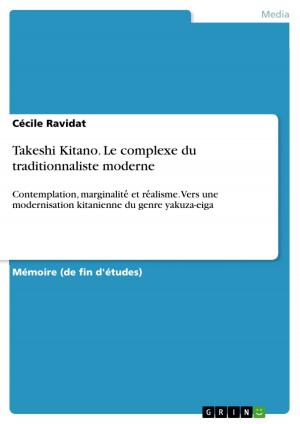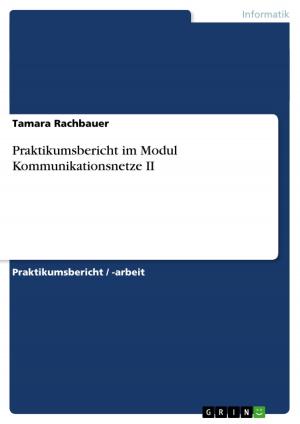Kognitive Persönlichkeitstheorien: Carl Rogers' klientenzentrierte Gesprächspsychotherapie
Nonfiction, Health & Well Being, Psychology, Personality| Author: | Arno Krause | ISBN: | 9783640585786 |
| Publisher: | GRIN Verlag | Publication: | April 6, 2010 |
| Imprint: | GRIN Verlag | Language: | German |
| Author: | Arno Krause |
| ISBN: | 9783640585786 |
| Publisher: | GRIN Verlag |
| Publication: | April 6, 2010 |
| Imprint: | GRIN Verlag |
| Language: | German |
Studienarbeit aus dem Jahr 2000 im Fachbereich Psychologie - Persönlichkeitspsychologie, Note: 1,2, Leopold-Franzens-Universität Innsbruck (Institut für Psychologie), Veranstaltung: Kognitive Persönlichkeitstheorien, Sprache: Deutsch, Abstract: Die klientenzentrierte oder nicht-direktive Gesprächspsychotherapie [GT] zählt neben Psychoanalyse und Verhaltenstherapie zu den erfolgreichsten und verbreitetsten Therapieformen in der westlichen Welt. Ausgehend von einer humanistisch orientierten positivistischen Perspektive des Menschen zeichnet ihr Begründer Carl R. Rogers mit Hilfe der von ihm festgelegten drei Kernvariablen ein neues Bild des Therapeuten, das es dem Klienten ermöglicht, seine Verhaltens- und Erlebniswelt konstruktiv zu verbessern. Dieser Effekt ist aber nicht nur auf die Einzeltherapie beschränkt, vielmehr wurde und wird Rogers' Therapie erfolgreich in Form von sogenannten Encounter-groups angewendet, also in Gruppen von fünf Klienten bis zu Marathon-Begegnungen mit bis zu 100 Beteiligten.- Der Therapieerfolg ist vielfach untersucht worden, am deutlichsten wird er aber in der Anwendung des bekannten Q-Tests, wo die Verbesserungen in Form von Korrelationen dargestellt sind. Summary C.R. Rogers's client-centered therapy [i.e. non-directive therapy] today is one of the most successful and widely accepted psychotherapies in USA and Europe beside psychoanalysis and behavioral therapy. Based on a humanistic influenced, positivistic image of man, its founder Carl R. Rogers created a new type of thera-pist, which - with the help of three main determinations - enables the client to change his neurotic way of ex-periencing and percepting the world. Moreover client-centered therapy is also useful in so called encounter-groups, that means groups of people from about five up to monster-encounters of about the size of one hun-dred participants. - Although in the begin non-directive therapy couldn't be empirically verified, today's Q-test is a valid tool for examining the success of therapy in the client by means of correlations. Structure and Process of Personality: In Rogers perspective the personality is an organised system that is open to influence by the environment, and, in turn, can influence the environment. The personality system contains basic, inherent forces that seem to maintain the equilibrium of the system and to promote ist growth (ie. Structure). The process: The basic aim of the system is the achievement of personal growth, which has been construed in terms of self-actualisation. Growth is a developmental process which proceeds through phases that are more-or-less distinct from one another. Thus healthy functioning is based on growth and freedom.
Studienarbeit aus dem Jahr 2000 im Fachbereich Psychologie - Persönlichkeitspsychologie, Note: 1,2, Leopold-Franzens-Universität Innsbruck (Institut für Psychologie), Veranstaltung: Kognitive Persönlichkeitstheorien, Sprache: Deutsch, Abstract: Die klientenzentrierte oder nicht-direktive Gesprächspsychotherapie [GT] zählt neben Psychoanalyse und Verhaltenstherapie zu den erfolgreichsten und verbreitetsten Therapieformen in der westlichen Welt. Ausgehend von einer humanistisch orientierten positivistischen Perspektive des Menschen zeichnet ihr Begründer Carl R. Rogers mit Hilfe der von ihm festgelegten drei Kernvariablen ein neues Bild des Therapeuten, das es dem Klienten ermöglicht, seine Verhaltens- und Erlebniswelt konstruktiv zu verbessern. Dieser Effekt ist aber nicht nur auf die Einzeltherapie beschränkt, vielmehr wurde und wird Rogers' Therapie erfolgreich in Form von sogenannten Encounter-groups angewendet, also in Gruppen von fünf Klienten bis zu Marathon-Begegnungen mit bis zu 100 Beteiligten.- Der Therapieerfolg ist vielfach untersucht worden, am deutlichsten wird er aber in der Anwendung des bekannten Q-Tests, wo die Verbesserungen in Form von Korrelationen dargestellt sind. Summary C.R. Rogers's client-centered therapy [i.e. non-directive therapy] today is one of the most successful and widely accepted psychotherapies in USA and Europe beside psychoanalysis and behavioral therapy. Based on a humanistic influenced, positivistic image of man, its founder Carl R. Rogers created a new type of thera-pist, which - with the help of three main determinations - enables the client to change his neurotic way of ex-periencing and percepting the world. Moreover client-centered therapy is also useful in so called encounter-groups, that means groups of people from about five up to monster-encounters of about the size of one hun-dred participants. - Although in the begin non-directive therapy couldn't be empirically verified, today's Q-test is a valid tool for examining the success of therapy in the client by means of correlations. Structure and Process of Personality: In Rogers perspective the personality is an organised system that is open to influence by the environment, and, in turn, can influence the environment. The personality system contains basic, inherent forces that seem to maintain the equilibrium of the system and to promote ist growth (ie. Structure). The process: The basic aim of the system is the achievement of personal growth, which has been construed in terms of self-actualisation. Growth is a developmental process which proceeds through phases that are more-or-less distinct from one another. Thus healthy functioning is based on growth and freedom.















